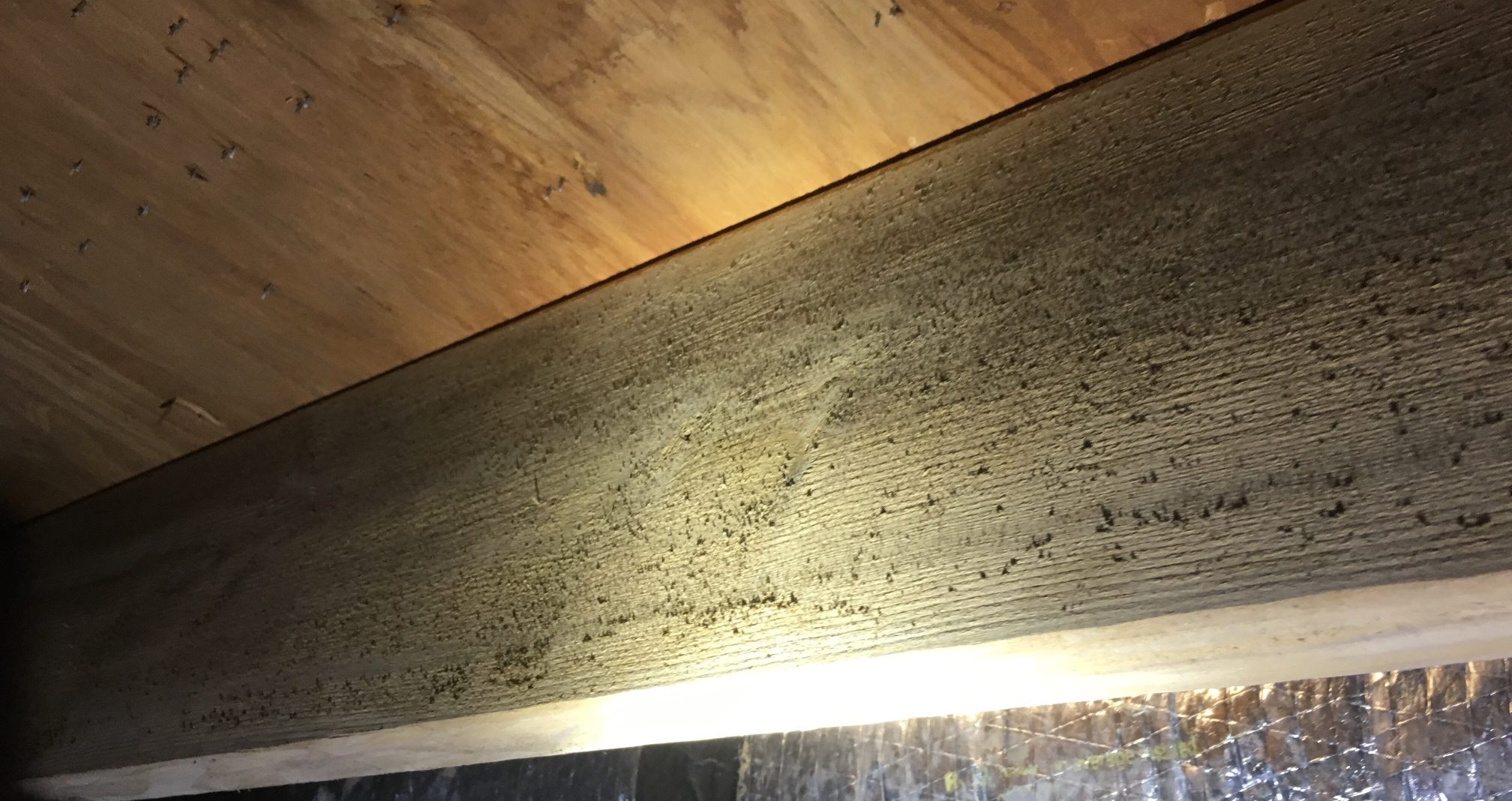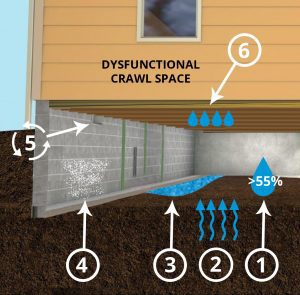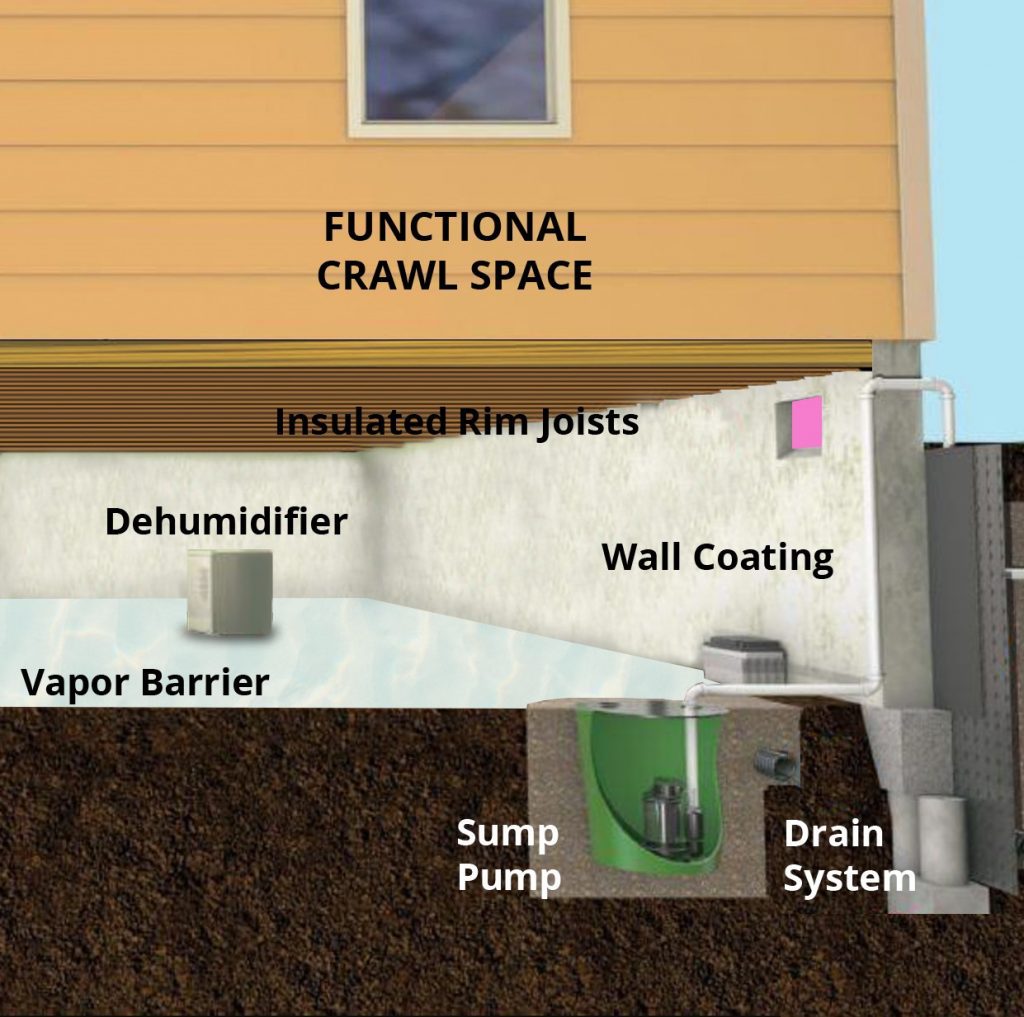
With the local high water table and close proximity to the Jersey Shore, South Jersey crawl spaces are especially vulnerable to water damage and mold. Some of the most common crawl space issues that cause mold include: high humidity, ground water vapors, ground seepage, flooding, leaky foundation walls, poor air circulation and condensation.
 What Causes Mold In New Jersey Crawl Spaces?
What Causes Mold In New Jersey Crawl Spaces?
Short answer… mold is caused by moisture. Unfortunately, New Jersey crawl spaces are often damp with conducive conditions for fungal activity. When airborne fungal spores come into contact with damp conditions, the spores germinate, spread and root into the porous, cellulosed based materials nearby. But, what causes the moisture buildup in the first place? Here are some of the most common moisture related crawl space issues plaguing South Jersey homeowners.
High Humidity:
I don’t know about you, but the humid Jersey summers are my least favorite part about living in South Jersey. As uncomfortable humidity feels for us, humidity is the worst for buildings. We will never be able to stress enough the role that high humidity plays in the development and spread of mildew in South Jersey buildings. High humidity is an especially prevalent problem in crawl spaces. Elevated crawl space humidity of 50% or higher means conducive conditions for crawl space fungal activity.
Ground Water Vapor Emission
A lot of homes in South Jersey and along the Jersey Shore are constructed with dirt floor crawl spaces. Ground water from the exposed dirt floor emits water vapors into the crawl space, which will rise with stack effect. As water vapors rise, the moisture clings to the wood framing and causes mold growth on crawl space floor joists and subflooring.
Flooding & Insufficient Drainage
Flooding is a common problem in South Jersey crawl spaces. Flood waters can quickly cause moldy conditions or aggravate existing crawl space issues.
Foundation Wall Seepage
Water intrusion at the foundation walls is a common issue. Ground water naturally wants to soak through masonry walls and water vapors naturally drive towards a cooler surface (aka, the interior side of the foundation wall). Add in a little heavy rain, and you have the perfect recipe leaky foundation walls. If you see efflorescence (a white, powder deposit) forming on your crawl space walls, you likely have moisture penetration that will need to be properly addressed. If you discover mold growth caused by leaky foundation walls, you will need a professional crawl space mold remediation first. Following remediation, you will stop the water penetration to prevent future recurrence.
Poor Air Circulation
Poor air circulation means that stagnant, damp air will be trapped in the crawl space, allowing moisture buildup with time. Water vapors will settle on wood floor joists and wood subfloors causing mold growth.
Condensation
Condensation can develop when warm, humid air comes into contact with the cool, metal surface of the ductwork or piping located in the crawl space. When the condensation evaporates, the water vapors can buildup on porous materials can cause crawl space mold problems.
How to Prevent Mold in My South Jersey Crawl Space
Whether it is just inexperience or a contractor said so — all too often, South Jersey homeowners convince themselves that the fight against crawl space moisture and mold is a pointless one because these issues are inevitable. This is a far cry from the truth. Most crawl spaces are salvageable. It is very possible to have a mold-free, healthy crawl space and keep it away with the right moisture control tactics.
You don’t have to just live with a wet and moldy crawl space. In fact, you shouldn’t live with a wet and moldy crawl space. Mold and moisture can cause serious property damage, building deterioration, structural issues, health effects, and diminished property value. So, let’s take a closer look at the things you could do as a South Jersey homeowner to prevent crawl space mold and keep a healthy crawl space for you and your family.

Eliminate ground water vapor emission by installing a vapor barrier over the dirt floor:
If you have a dirt floor crawl space, it is recommended to install a crawl space vapor barrier that will contain the ground water vapors and keep the vapors from emitting into the crawl space. A crawl space vapor barrier is a layer of heavy-duty plastic installed over the dirt floor of a crawl space to control moisture emitted through the dirt floor. Vapor barriers control moisture levels by slowing or preventing the evaporation of ground moisture into the crawl space air.
Assess the drainage and install a sump pump and/or water proofing system as needed:
Given the high water table of the local South Jersey areas, it is not always possible stop crawl space flooding and water seepage in its entirety. However, it is possible to redirect and drain the water out and away from the crawl space before the water has the opportunity to cause any major damage. If you experience flooding or seepage, you should consult a waterproofing professional to determine the proper drainage needed to direct water rout and away from the structure.
Seal the crawl space to prevent water penetration:
South Jersey homeowners often attempt to reduce crawl humidity without mechanical means by installing vents. Unfortunately, often times, hot humidity air from outside gets pulled into the crawl space and further perpetuates the humidity problems. In some cases, crawl space ventilation can be very successful, but not in all cases. Mechanical dehumidification is the most reliable and consistent method. In that case, all wall penetrations should be sealed. The crawl space rim joists should be insulated, ductwork and pipes should be properly insulated. This coupled with a vapor barrier, sump pump and/or drain system, and dehumidifier will create a conditioned space that will ensure moisture control over time.
Monitor crawl space humidity levels and take action to maintain relative humidity levels below 50%:
By eliminating any water penetration from your foundation walls and from ground water seepage, you already took one of the biggest steps in getting the humidity under control. No water intrusion means no water evaporation that will contribute to and exacerbate humidity. To really ensure that you maintain low humidity, you should install a properly rated crawl space dehumidifier that is properly rated for the size of the space. It is best to select a dehumidifier with a condensation pump that will direct and drain water to the exterior, so you don’t have to constantly empty a water receptacle.
Crawl Space Mold Remediation in South Jersey Homes
Moldy crawl spaces often require professional remediation by a mold specialist. If you discover crawl space moisture issues that have caused a moldy crawl space, you should consult a local mold removal company in South Jersey who will have the necessary equipment, training, certifications and experience needed to perform proper crawl space cleaning and restore a healthy environment. When dealing with crawl space issues, the order of operations should be to remove the mold first. Then, you can address the moisture issues. If you don’t remove the mold before you have other contractors do work in the crawl space, you could risk cross-contamination and the spread of mold to previously clean areas. If there is standing water in the crawl space, a remediation company will have the necessary equipment to extract flood waters from the crawl space before starting the cleanup process. Following a proper crawl space cleaning, you will be able to have the necessary contractors come in and address the moisture to prevent future issues.
Mastertech Environmental is locally owned and operated mold cleanup company in Blackwood New Jersey. We service all of Camden County, Burlington County and Gloucester County. With years of industry knowledge and experience, our local mold specialists perform the highest quality of crawl space mold remediation in South Jersey to return safe and healthy crawl spaces, so you can your family and trust that your home is in good hands. If you are worried that crawl space issues have caused subsequent issues in other areas of the home, we can conduct air quality testing for mold in the living space to assess for elevated concentrations of airborne spores that could be affecting the air you breathe. Contact our local South Jersey office today to learn more about our cleanout services near you — [phone].


